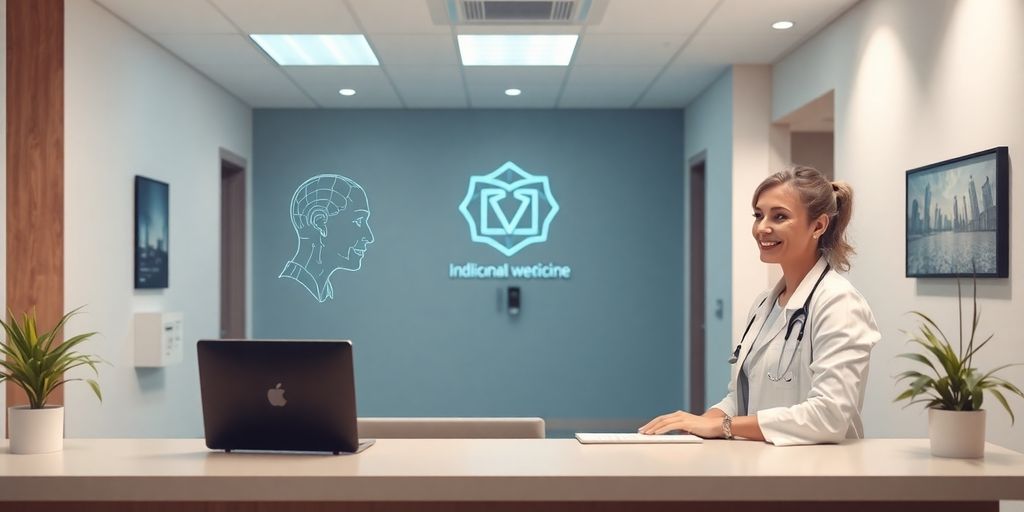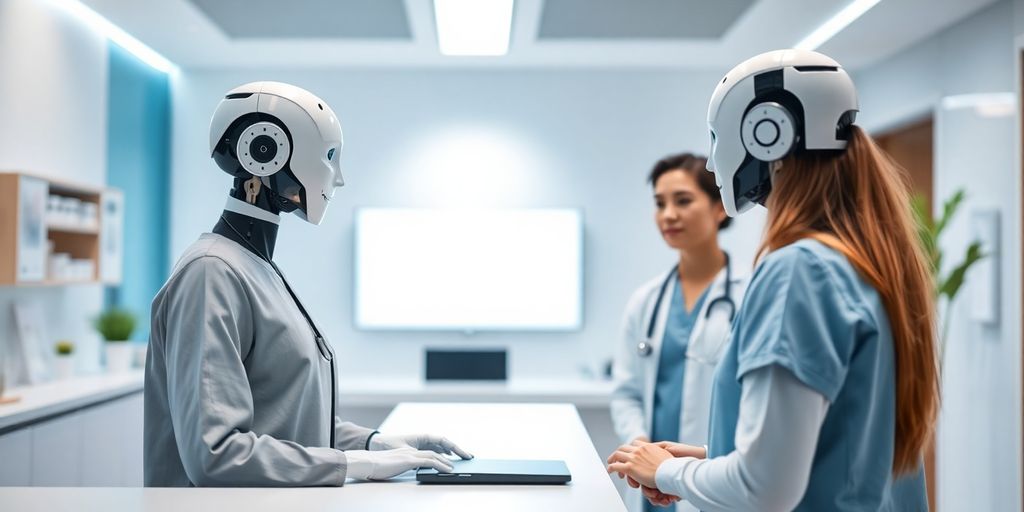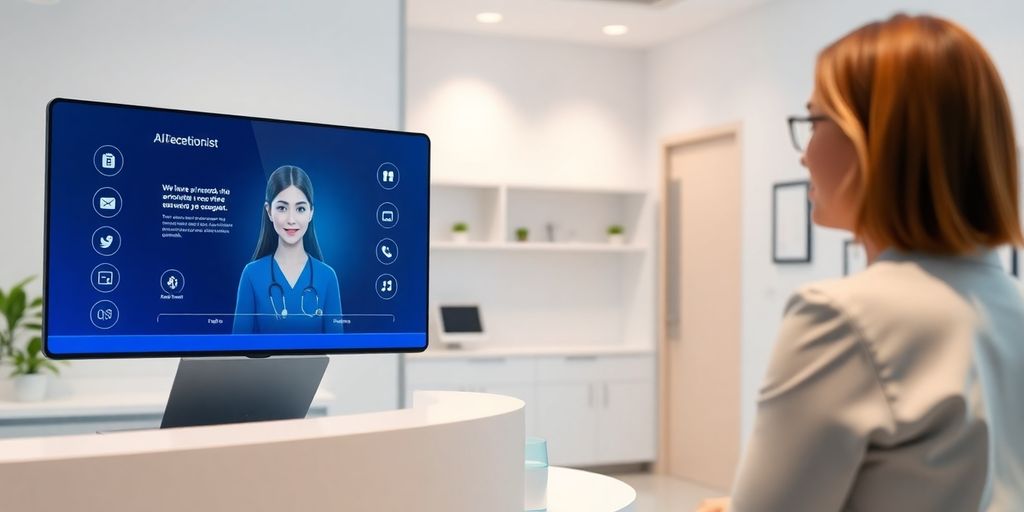Choosing the right AI receptionist for your medical office in 2025 is a big decision. It's not just about answering phones; it's about improving patient experience and making your practice run smoother. With so many options out there, how do you pick the one that actually fits your needs? We'll break down what to look for and why an AI receptionist might be the best move for your practice.
In today's fast-paced medical world, the front desk can get pretty hectic. Think about it: phones ringing off the hook, patients arriving, and staff trying to manage everything. It's a lot. This is where AI receptionists are really starting to make a difference, especially in healthcare settings. They're not just about answering phones; they're about making the whole patient experience smoother and letting your actual staff focus on what matters most – patient care.
AI receptionists can handle a lot of the routine communication that eats up a lot of time. This means patients can get answers to common questions, confirm appointments, or even request prescription refills without having to wait on hold. It's like having an extra team member who's always available to help with these tasks. This frees up your human staff to deal with more complex patient needs or direct care.
When the AI handles the administrative chatter, your nurses, doctors, and support staff can dedicate more time to direct patient interaction. Imagine fewer interruptions during consultations or procedures because the AI is managing appointment confirmations or answering basic insurance questions. This shift allows healthcare professionals to provide a higher quality of care and reduces burnout from constant administrative tasks. It’s about getting back to the core mission of healthcare.
Medical needs don't stick to a 9-to-5 schedule, and neither should your front-desk support. An AI receptionist provides round-the-clock assistance. Patients can call anytime to book an appointment or get information, even outside of regular office hours. This constant availability means no missed opportunities for new patients and better service for existing ones. It’s a big step up from relying solely on human staff who need breaks and sleep. You can find more information on how these systems work at AI receptionist solutions.
The goal is to create a more efficient and patient-centric environment where technology supports, rather than replaces, the human element of care. By automating routine tasks, AI receptionists allow medical practices to operate more smoothly and provide a better experience for everyone involved.

When looking for an AI receptionist for your medical office, certain features really make a difference in how well it works for you and your patients. It’s not just about answering the phone; it’s about creating a positive and efficient experience from the very first interaction.
The AI should sound natural, not like a robot reading a script. This means using varied intonation, appropriate pauses, and a friendly, empathetic tone. Patients are often calling when they're feeling unwell or anxious, so a warm, understanding voice can go a long way. Think about how a real person would greet someone and try to put them at ease. This helps build trust right away.
This is a big one. The AI receptionist needs to talk to your existing systems, like your electronic health records (EHR) or practice management software (PMS). If it can directly access patient information, schedule appointments, or update records without manual data entry, it saves your staff a ton of time and reduces errors. Imagine the AI pulling up a patient's file to answer an insurance question – that’s the kind of efficiency we’re talking about. You can check out solutions like My AI Front Desk to see how this integration works.
An effective AI receptionist can handle the entire appointment lifecycle. This includes booking new appointments, rescheduling existing ones, and sending out timely reminders. These reminders can be sent via text or email, helping to reduce no-shows significantly. The AI can also confirm appointments, asking patients to bring specific documents or information, which streamlines the check-in process.
If your practice serves a diverse community, having an AI that can communicate in multiple languages is incredibly helpful. This opens up your services to more people and makes them feel more welcome and understood. It’s about providing accessible care, and language shouldn't be a barrier. This capability can really set your practice apart and improve patient satisfaction across the board.

When you're looking at AI receptionists for your medical office, it's not just about answering the phone. You want a system that can actually do some of the heavy lifting, freeing up your human staff to focus on what matters most: patient care. Think of it as a super-efficient assistant that handles the routine stuff so your team doesn't have to.
This is a big one. Patients often call with questions about their coverage, deductibles, or what a specific procedure might cost. An AI receptionist can be programmed to access basic information from your system, explain common insurance terms, and even tell patients what information they'll need to have ready when they speak to your billing department. It's not about giving medical advice, but about clarifying administrative details. For example, it could pull up information like, "Your plan covers 80% of preventative care after your deductible is met." This kind of information can really help manage patient expectations and reduce the number of calls your front desk has to field about billing.
Every practice has those frequently asked questions that come up day after day. Things like "What are your office hours?", "Where are you located?", "What should I bring to my appointment?", or "Do you have parking available?". An AI can answer these instantly, 24/7. It can also provide details about what patients need to bring, like their insurance card, a list of current medications, or any relevant medical records. This consistency means every patient gets the same accurate information, and your staff isn't repeating the same answers over and over. It's about making sure patients are prepared and informed before they even walk through the door.
Handling prescription refill requests can be time-consuming. An AI receptionist can take these requests over the phone or via text. It can gather all the necessary information – patient name, date of birth, medication name, dosage, and prescribing doctor. Once it has this data, it can trigger a workflow to send the request to the appropriate person or system for review and approval. This streamlines the process significantly, ensuring that requests are captured accurately and efficiently, and that your clinical staff can manage them without constant interruptions.
Not every call requires immediate attention from a doctor or nurse. An AI can act as a first line of defense, triaging non-emergency calls. For instance, if a patient calls with a question about a minor issue that doesn't seem urgent, the AI can collect details about the concern and then route the call or message to the appropriate department or staff member, perhaps the nurse line or a specific administrative team. It can also identify calls that need to be escalated to a human immediately, like if a patient expresses severe symptoms. This helps ensure that critical calls get the attention they need quickly, while less urgent matters are handled systematically. It's about making sure the right person gets the right call at the right time, without overwhelming your clinical staff with administrative tasks. This kind of system can really help practices like My AI Front Desk manage their incoming communication more effectively.
When you're thinking about how to handle your medical office's calls, it's natural to compare what an AI virtual receptionist can do versus what a traditional human receptionist offers. They both aim to manage patient interactions, but they go about it in pretty different ways, and the differences can really impact your practice.
One of the biggest distinctions is availability. Your human receptionist likely works set hours, maybe 9 to 5, with breaks and days off. An AI receptionist, though? It's on 24/7. No sick days, no holidays, no lunch breaks. This means patients can get information or schedule appointments anytime, which is a big deal for healthcare. Plus, AI can handle a massive number of calls at once. If your office suddenly gets swamped with calls, an AI can manage hundreds simultaneously without getting flustered. A human receptionist, on the other hand, can typically only handle one or maybe two calls at a time.
Human receptionists, as great as they are, can have off days. Their tone, how they answer questions, or even their mood can vary. This can lead to inconsistent patient experiences. AI receptionists, however, are programmed to follow specific scripts and maintain a consistent tone and demeanor. **This means every patient interaction, regardless of the time of day or who is

Bringing an AI receptionist into your medical office might seem like a big step, but it doesn't have to be a headache. Think of it like adding a new member to your team, but one that's available all the time and never needs a coffee break. The key is to plan it out right, so it works smoothly with what you're already doing.
First things first, you need to figure out how you want calls to be handled. What are the most common reasons people call your office? Is it to book appointments, ask about insurance, or request prescription refills? You'll want to map out what a successful interaction looks like for each of these. For example, when someone calls to book an appointment, what information does the AI need to collect? Does it need to check the doctor's availability? What happens if the doctor is fully booked? Thinking through these scenarios helps create clear instructions for the AI.
Next, list out all those frequently asked questions your front desk staff handles daily. Things like office hours, what to bring to an appointment, directions, or even basic information about accepted insurance plans. The more common questions you can anticipate, the more the AI can handle, freeing up your human staff for more complex patient needs. You can even include questions about preparing for specific procedures or what to expect during a visit. This information will form the basis of the AI's knowledge base.
Once you have your call flows and common inquiries defined, it's time to set up the AI. This involves inputting the information you've gathered and testing it. You'll want to run through various scenarios to make sure the AI responds correctly and politely. It's also a good idea to have your current staff involved in this process. They know the day-to-day operations best and can offer insights. Training your staff on how the AI works and how to handle situations where the AI might need to hand off a call to them is also important. Think of it as a team effort to make patient communication better for everyone.
Let's talk about making your appointment process smoother with AI. It's not just about answering phones; it's about making sure patients get booked correctly and efficiently. This technology can really cut down on the time your front desk spends on routine tasks.
Imagine a system that handles appointment requests automatically. Patients can call in, and the AI can guide them through available slots, confirm their details, and even send out reminders. This means fewer phone calls for your staff and a more convenient experience for patients. It's like having an extra pair of hands that never gets tired. You can get started with solutions like V2 Turbo to see how this works.
Your front-desk team is often swamped with scheduling, rescheduling, and confirming appointments. By letting an AI handle these tasks, your staff can focus on more complex patient needs, greeting visitors, and providing a personal touch. This shift allows them to be more present and helpful, improving the overall office atmosphere.
No-shows can be a real problem for medical offices. AI can be programmed to send out appointment reminders via text or email at strategic times before the appointment. This proactive approach helps reduce missed appointments significantly, leading to better schedule utilization and fewer lost revenue opportunities. It's a simple step that makes a big difference.
When you're bringing an AI receptionist into your medical office, keeping patient information safe and following all the rules is super important. It's not just about being polite; it's about legal requirements and building trust with your patients. Think about it, you're dealing with really personal health details, so you've got to be extra careful.
The Health Insurance Portability and Accountability Act (HIPAA) sets the standards for protecting sensitive patient health information. Any AI system you use must be designed with HIPAA in mind. This means the AI vendor needs to have business associate agreements (BAAs) in place, which basically means they agree to handle your protected health information (PHI) according to HIPAA rules. You can't just assume an AI is compliant; you need to verify it. It’s a big deal for any medical practice, and you can find more information on how to approach this on the HHS website.
Beyond just HIPAA, think about the actual data flow. How does the AI get the patient's information? Is it encrypted during transmission and while stored? Does the AI system have access controls, so only authorized personnel can see certain data? You want to make sure that the information isn't just floating around unsecured. For example, a service like AI Front Desk provides a platform that handles calls, but you still need to understand how they manage the data they process on your behalf.
This ties into the previous points, but it's worth emphasizing. Sensitive medical data includes everything from appointment details and medical history to insurance information. The AI should be programmed to only access and share the minimum necessary information to complete a task. For instance, if a patient calls about a refill, the AI should only access the information needed to process that specific request, not the patient's entire medical chart. It’s about creating clear boundaries for data access and usage within the AI's operational scope.

Once your AI receptionist is up and running, the work isn't quite done. Think of it like training a new employee – you've got to check in, see how they're doing, and help them get better. This means keeping an eye on how many calls the AI is actually handling and what the success rate is for things like booking appointments. Are patients getting the information they need, or are there still some calls that aren't getting resolved properly?
Gathering feedback from your patients is also a big part of this. Did they find the AI helpful? Was the conversation easy to follow? You can even set up your AI to ask for a quick rating at the end of a call. This kind of input is gold. If the AI stumbles on certain questions or doesn't quite get the tone right, you need to fix it quickly. Update those scripts, refine the conversation paths, and add new frequently asked questions as your practice evolves. It’s a continuous cycle of improvement.
The goal is to make the AI a true extension of your practice's excellent service, not just a voice on the phone. It should sound like your best receptionist on their best day, always ready to help.
For instance, if you notice a lot of patients asking about a new telehealth service, you'll want to make sure the AI is prepped with all the details and can guide them through the process. This proactive approach helps maintain a high level of patient care and keeps your AI assistant relevant and effective. It’s about making sure your AI is always learning and adapting, just like your practice does. You can find great AI solutions that integrate well with your existing systems, making this optimization process much smoother, like those offered by My AI Front Desk.
While AI receptionists offer a lot of benefits, it's not all smooth sailing. We need to be realistic about what they can and can't do, especially in a medical setting where precision and empathy are so important. It’s easy to get excited about the tech, but we have to remember the human element.
Sometimes, a patient isn't just asking for directions or hours. They might be describing symptoms, expressing anxiety, or dealing with a sensitive personal issue. AI can struggle here. It's tough for an AI to pick up on the subtle cues, the emotional undertones, or the sheer complexity that a human can process. If a patient is in distress or needs to explain a complicated medical history, the AI might not grasp the full picture. This is where a human touch is still really needed, or at least a very clear pathway for the AI to hand off the call to a person who can help.
We live in a diverse world, and medical offices serve everyone. While AI is getting better, it can still have trouble understanding certain accents or dialects. If the AI can't clearly understand what a patient is saying, it can lead to frustration and miscommunication. This isn't just about inconvenience; it could mean important medical information is missed or misunderstood. For practices serving a wide range of patients, this is a big hurdle to clear. It’s why having options for human support or AI that’s specifically trained on diverse speech patterns is so important. You don't want a patient to feel unheard because the AI couldn't quite catch their words.
Let's be honest, some people just don't trust AI. They might feel like they're not being taken seriously, or that the AI is just a barrier to talking to a real person. This skepticism can be a real issue, especially when dealing with health concerns. If a patient is already worried about their health, interacting with a machine that feels impersonal can add to their stress. Building trust is key in healthcare, and that trust can be damaged if the AI experience feels cold or unhelpful. It’s important to manage these expectations and make sure the AI is presented as a helpful tool, not a replacement for human care. Sometimes, a simple message like, "I'm an AI assistant here to help you quickly, but I can connect you to a person if needed," can go a long way. We want patients to feel cared for, not just processed. For example, a dental clinic might focus on clear communication to build patient trust, and AI needs to do the same [d2da].
So, you're looking to figure out which AI receptionist is the best fit for your medical office in 2025. It's a big decision, and honestly, there isn't one single 'best' for everyone. It really comes down to what your practice needs most. You'll want to look at solutions that are built with healthcare in mind, not just generic ones. Think about how well they can handle medical terms and patient privacy.
When you're shopping around, see if the AI provider has experience with medical practices. Do they understand things like HIPAA? Can they handle common medical questions or insurance jargon? Some companies focus just on healthcare, and that can make a big difference. They've already worked out the kinks for things like appointment scheduling and prescription refill requests, which is a huge time saver for your staff. It's like hiring someone who already knows your job before they even start.
This is a big one. You want an AI that can actually understand what patients are saying, not just keywords. Good natural language processing (NLP) means the AI can follow a conversation, understand different accents, and respond in a way that sounds like a real person. This makes patients feel heard and respected. If the AI constantly misunderstands or sounds robotic, patients might get frustrated and look elsewhere. You can test this by having it handle common patient questions or appointment booking scenarios. A system that can handle a variety of conversational flows will be much more effective.
Finally, think about how the AI receptionist will connect with your current systems. Does it work with your practice management software? Can it sync with your electronic health records (EHR) or patient portal? A system that integrates smoothly means less manual data entry for your staff and fewer errors. It should be able to pull up patient information, check appointment availability, and update records automatically. This kind of connection is what really makes the AI a helpful tool, rather than just another piece of software to manage. You can check out options like My AI Front Desk to see how they connect with other applications.
When looking for the best AI receptionist for your medical office, you want one that's always available and handles calls smoothly. Our AI receptionist is designed to do just that, making sure your patients always get the help they need, day or night. It can book appointments and answer common questions, freeing up your staff. Want to see how it works? Visit our website to learn more and try it out!
So, picking the right AI receptionist for your medical office in 2025 really comes down to what fits your practice best. We’ve looked at how these tools can handle calls 24/7, book appointments, and even answer common patient questions, freeing up your staff to focus on actual patient care. Remember to check for features like natural-sounding voices, integration with your existing systems, and the ability to escalate calls to a human when needed. While AI is super helpful, it’s not about replacing your team entirely, but rather giving them a powerful assistant. By carefully considering your office’s specific needs and looking at what different AI receptionists offer, you can find a solution that makes things run smoother and improves the experience for everyone.
Think of an AI receptionist as a super-smart computer program that can talk on the phone. It's designed to sound like a real person and can handle many of the tasks a human receptionist does, like answering calls, scheduling appointments, and answering common questions. It's available all day, every day, so your medical office never misses a call.
AI receptionists help by taking care of routine phone tasks. This frees up your human staff to focus more on patients who are actually in the office. It's like giving your team more time to provide direct care and attention, making everyone happier.
Yes, many AI receptionists can connect with your current office software, like your appointment calendar and patient records system. This means they can book appointments, check patient information, and update records automatically, making everything run more smoothly.
AI receptionists are great at scheduling appointments and sending reminders. They can book new appointments, confirm existing ones, and even remind patients about upcoming visits. This helps reduce no-shows and makes sure patients don't forget their appointments.
When it comes to patient information, security is super important. Good AI receptionist systems are built to follow strict rules, like HIPAA, to keep all patient details safe and private. They are designed to handle sensitive medical information with care.
While AI is very advanced, it's best for handling common questions and routine tasks. If a patient has a very complicated medical question or needs to talk about something sensitive or emotional, the AI can be set up to pass that call to a human staff member.
Many AI receptionists can speak more than one language. This is really helpful for medical offices with patients who speak different languages. It makes sure everyone can communicate easily and feel understood.
Setting up an AI receptionist usually involves choosing a service, telling it how you want calls handled, and connecting it to your office systems. Many providers offer easy setup and training to make sure it works well for your specific needs. It's not usually a difficult process.
Start your free trial for My AI Front Desk today, it takes minutes to setup!








